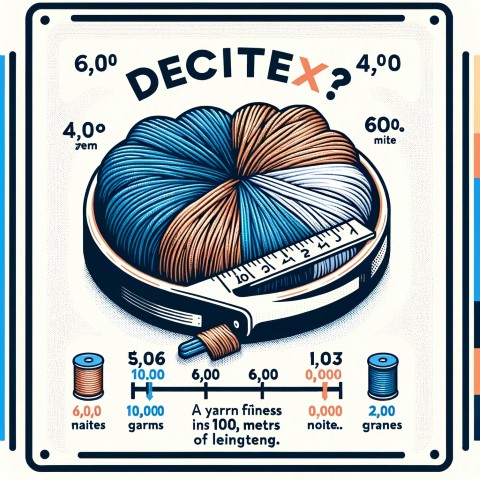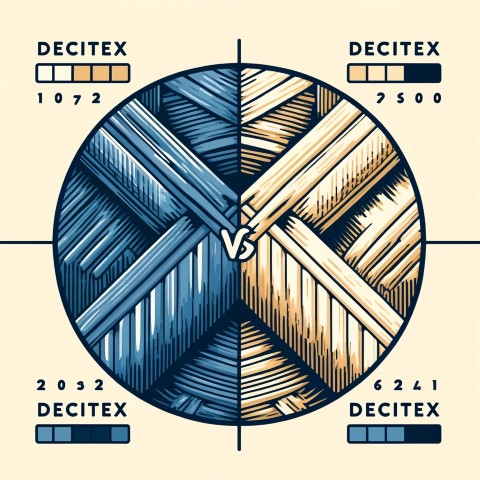Last Updated on: 12-May-2024 (2 months, 15 days ago)
Share on Facebook • Share on Twitter
In the textile industry, Decitex (dtex) is a unit of measurement used to determine the linear density or fineness of fibers or yarns. It represents the weight in grams per 10,000 meters of the fiber or yarn being measured. Decitex is an essential parameter for assessing the quality and performance of textiles, especially in applications such as apparel, upholstery, and industrial textiles.
The concept of measuring the linear density of fibers dates back to the early 20th century. The International Bureau of Weights and Measures (BIPM) established the decitex unit in the late 1950s as part of the metric system. The term "decitex" originates from the combination of "deci," which represents one-tenth of a unit, and "tex," the unit of measurement for linear density.
Decitex can be categorized into different types based on the nature of the fibers or yarns being measured:
- Single-Fiber Decitex: This type of Decitex measures the linear density of individual fibers. It provides information about the thickness and fineness of a single fiber, which is crucial in determining the quality and performance of textiles.
- Filament Yarn Decitex: Filament yarn Decitex measures the linear density of continuous filaments used in the production of yarns. It helps determine the strength, thickness, and appearance of filament yarns.
- Spun Yarn Decitex: Spun yarn Decitex measures the linear density of yarns made from short staple fibers. It indicates the thickness, strength, and bulkiness of spun yarns.
When working with textiles and considering Decitex, it is essential to keep the following tips in mind:
- Understanding Fiber Types: Different fibers, such as cotton, polyester, or nylon, have varying Decitex values, which influence their performance and properties. Familiarize yourself with the characteristics of different fibers to choose the most suitable option for your desired application.
- Impact on Fabric Properties: Decitex affects various fabric properties, including drape, texture, strength, and durability. Lower Decitex values indicate finer fibers or yarns, resulting in a softer and more delicate fabric, while higher Decitex values indicate coarser and sturdier materials.
- Application Considerations: Understanding Decitex helps in selecting appropriate textiles for specific applications. For example, finer Decitex fabrics are often preferred in high-end apparel, while coarser Decitex fabrics may be suitable for heavy-duty industrial or outdoor applications.
Top International Users and Manufacturers
Several top international users and manufacturers employ Decitex as a crucial parameter in their textile production. Here are some notable examples:
- Louis Vuitton: Known for its luxury fashion and accessories, Louis Vuitton utilizes Decitex to ensure the quality and fineness of their fabrics and yarns, maintaining their reputation for excellence.
- Gucci: Gucci, a renowned fashion brand, pays meticulous attention to Decitex in their textile manufacturing, enabling them to produce fabrics that meet their high standards of quality and craftsmanship.
- Patagonia: As a leading outdoor clothing and gear manufacturer, Patagonia incorporates Decitex as a vital factor in selecting textiles that can withstand rugged outdoor conditions while providing comfort and performance.
- Nike: Nike, a global athletic footwear and apparel brand, relies on Decitex to ensure the appropriate performance attributes of their textiles, catering to the needs of athletes and active individuals.
- Armani: Armani, a prominent fashion house, emphasizes Decitex to create textiles that embody their signature elegance, ensuring a balance between luxury and comfort.
- Zara: Zara, a popular fast-fashion retailer, leverages Decitex to offer a wide range of textiles and garments that meet various consumer preferences and price points.
Decitex serves as a crucial measurement in the textile industry, allowing for the assessment of fiber and yarn fineness. Understanding Decitex helps in selecting appropriate textiles for specific applications, considering fabric properties, and meeting desired quality standards. Leading international users and manufacturers, such as Louis Vuitton, Gucci, and Nike, rely on Decitex to ensure the quality and performance of their textiles, reinforcing its significance in the advanced textile manufacturing sector.
A unit of the tex system. A measure of linear density; the weight in grams of 10,000 metres of yarn.
Some more terms:
Vinyon
A synthetic fiber polymer made from polyvinyl chloride. In some countries other than the United States, vinyon fibers are referred to as polyvinyl chloride fibers and is similar in nature to vinyl....
Read about VinyonLock Stitch
This stitch is formed by three or four consecutive stitches of at least a 10 point movement. It should be used at the end of all columns, fills and any element where a trim will follow, such as color...
Read about Lock StitchCrepe
Used to describe all kinds of fabrics--wool, cotton, silk, rayon, synthetics and blends-that have a crinkle, crimped or grained surface. Made from worsted cotton, wool, silk, man-made synthetics. Has...
Read about CrepeMoccasin
Moccasin is a native American word, and means a shoe made of deerskin or soft leather. It is made in one piece; the sole is soft and flexible and the upper part is often adorned with embroidery,...
Read about MoccasinFlame Resistant Textiles: Unleashing the Power of Fire Protection
Fabrics treated with special chemical agents or finishes to make them resistant to burning. Today many fabrics achieve this property by using fibers that have this property built directly into the...
Read about Flame ResistantHigh-Temperature Dyeing
Dyeing under pressure higher than atmospheric pressure with the object of raising the temperature of the dye liquor above its normal boiling point. NOTE: The term "pressure dyeing" in this connection...
Read about High-Temperature DyeingBleaching
The procedure, other than by scouring only, of improving the whiteness of a textile by decolourising it from the grey state, with or without the removal of the nature colouring matter or extraneous...
Read about BleachingSocks
A sock is a baglike covering for the foot and/or lower leg, which is designed to ease chafing between the foot to keep the feet warm and absorb sweat from the feet. Sock lengths vary, from covering...
Read about SocksOn this page
Add a definition
- The term you want to define
- Its definition in 500 words or less
- Attach an image if necessary.
- Optionally, tell us about yourself in 200 words or less!
Companies for Decitex:
- Company name
- Company address
- Attach a logo, if necessary.
- Optionally, tell us about yourself in 200 words or less!

 Fashion designer Wendell Rodricks was known for promoting Goan culture and traditions through his designs.
Fashion designer Wendell Rodricks was known for promoting Goan culture and traditions through his designs.

